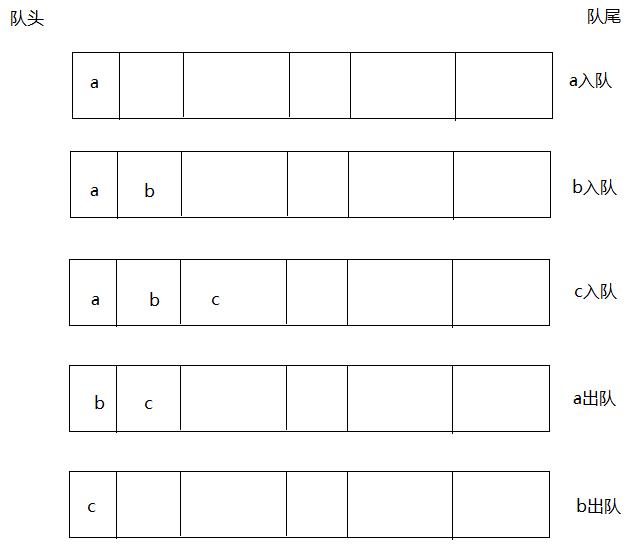JavaScript数据结构——队列的实现
Posted Devil丶俊锅
tags:
篇首语:本文由小常识网(cha138.com)小编为大家整理,主要介绍了JavaScript数据结构——队列的实现相关的知识,希望对你有一定的参考价值。
前面楼主简单介绍了javascript数据结构栈的实现,http://www.cnblogs.com/qq503665965/p/6537894.html,本次将介绍队列的实现。
队列是一种特殊的线性表,特殊之处在于它只允许在表的前端(front)进行删除操作,而在表的后端(rear)进行插入操作,和栈一样,队列是一种操作受限制的线性表。进行插入操作的端称为队尾,进行删除操作的端称为队头。
队列的两种主要操作是:向队列中插入新元素和删除队列中的元素。插入操作也叫做入队,删除操作也叫做出队。入队操作在队尾插入新元素,出队操作删除队头的元素。下图演示了这两个操作。

队列的另外一项重要操作是读取队头的元素。这个操作叫做 peek() 。该操作返回队头元素,但不把它从队列中删除。除了读取队头元素,我们还想知道队列中存储了多少元素,可以使用 length 属性满足该需求;要想清空队列中的所有元素,可以使用 clear() 方法来实现。下表定义了队列的一些主要方法:
| dataStorage | Array | 存储数据的底层数据结构 |
| enqueue | int | 入队 |
| dequeue | fucntion | 出队 |
| front | fucntion | 返回队首元素 |
| back | fucntion | 返回队尾元素 |
| toString | fucntion | 显示队列内的所有元素 |
| empty | function | 判断队列是否为空 |
队列的实现
1 function Queue(array) { 2 if (array instanceof Array) { 3 this.dataStorage = array; 4 } else { 5 throw "\'"+array + "\' is not an Array"; 6 } 7 } 8 9 Queue.prototype = { 10 enqueue: function (element) {//向队列中添加元素 11 this.dataStorage.push(element); 12 }, 13 dequeue: function () {//删除队首元素 14 return this.dataStorage.shift(); 15 }, 16 front: function () {//返回队首元素 17 return this.dataStorage[0]; 18 }, 19 back: function () {//返回队尾元素 20 return this.dataStorage[this.dataStorage.length - 1]; 21 }, 22 toString: function () {//输出队列中所有元素 23 var result = ""; 24 for (var i = 0; i < this.dataStorage.length; i++) { 25 result += this.dataStorage[i] + "\\t"; 26 } 27 return result; 28 }, 29 empty: function () {//判定队列是否为空 30 if (this.dataStorage.length == 0) { 31 return true; 32 } 33 return false; 34 } 35 }
测试:
1 var queue = new Queue([\'a\',\'b\']); 2 console.log(queue.toString()); 3 //queue.dequeue();//a出队 4 //console.log(queue.toString()); 5 console.log(queue.front());//队头元素 6 console.log(queue.back());//队尾元素 7 queue.dequeue(); 8 queue.dequeue(); 9 console.log(queue.empty());
队列的应用——基数排序
原理:对于 0~99 的数字,基数排序将数据集扫描两次。第一次按个位上的数字进行排序,第二次按十位上的数字进行排序。每个数字根据对应位上的数值被分在不同的盒子里。
假设有这样一个数组:{4, 73, 51, 76, 70, 19, 63, 64, 43, 12},经过基数排序第一次扫描之后,数字被分配到如下盒子中:
1 Box 0: 70 2 Box 1: 51 3 Box 2: 12 4 Box 3: 73,63,43 5 Box 4: 4,64 6 Box 5: 76 7 Box 6: 8 Box 7: 9 Box 8: 10 Box 9: 19
根据盒子的顺序,对数字进行第一次排序的结果如下:
70,51,12,73,63,43,4,64,76,19
然后根据十位上的数值再将上次排序的结果分配到不同的盒子中:
1 Box 0: 4 2 Box 1: 12,19 3 Box 2: 4 Box 3: 5 Box 4: 43 6 Box 5: 51 7 Box 6: 63,64 8 Box 7: 70,73,76 9 Box 8: 10 Box 9:
最后,将盒子中的数字取出,组成一个新的列表,该列表即为排好序的数字:
4,12,19,43,51,63,64,70,73,76
使用队列代表盒子,可以实现这个算法。我们需要九个队列,每个对应一个数字。将所有队列保存在一个数组中,使用取余和除法操作决定个位和十位。算法的剩余部分将数字加入相应的队列,根据个位数值对其重新排序,然后再根据十位上的数值进行排序,结果即为排好序的数字。
下面是根据相应位(个位或十位)上的数值,将数字分配到相应队列的方法:
1 function allocation(nums,queues,n,digit) { 2 for (var i = 0; i < n; ++i) { 3 if (digit == 1) { 4 queues[nums[i] % 10].enqueue(nums[i]); 5 } 6 else { 7 queues[Math.floor(nums[i] / 10)].enqueue(nums[i]); 8 } 9 } 10 }
下面是从队列中收集数字的方法:
1 function collection(queues, nums) { 2 var i = 0; 3 for (var digit = 0; digit < 10; ++digit) { 4 while (!queues[digit].empty()) { 5 nums[i++] = queues[digit].dequeue(); 6 } 7 } 8 }
测试程序:
1 var queues = []; 2 for (var i = 0; i < 10; ++i) { 3 queues[i] = new Queue([]); 4 } 5 var nums = []; 6 for (var i = 0; i < 10; ++i) {//目标排序数组 7 nums[i] = Math.floor(Math.floor(Math.random() * 101)); 8 } 9 console.log("排序前:"); 10 showArray(nums); 11 allocation(nums, queues, 10, 1); 12 collection(queues, nums); 13 allocation(nums,queues,10,10); 14 collection(queues, nums); 15 console.log("排序后"); 16 showArray(nums); 17 18 function showArray(array) { 19 console.log(array); 20 }
结果:

下篇楼主将带来,链表的实现。
本文的示例代码地址:https://github.com/LJunChina/JavaScript
以上是关于JavaScript数据结构——队列的实现的主要内容,如果未能解决你的问题,请参考以下文章